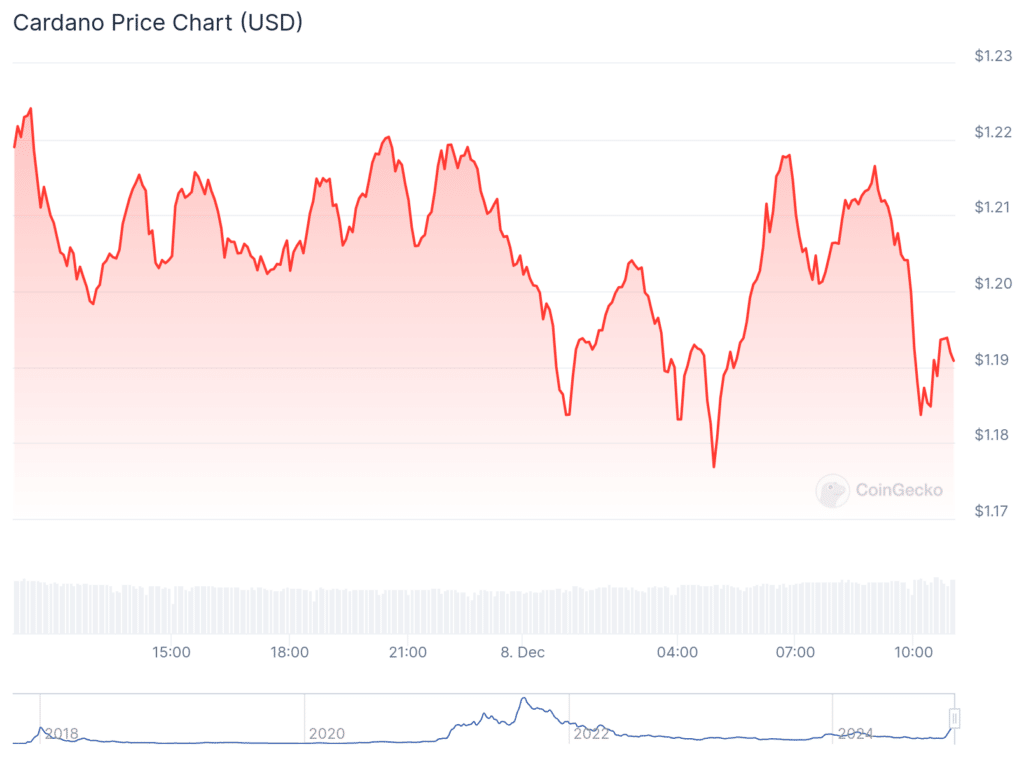Cardano hacked on social media: CEO says ‘try harder’ after fake lawsuit news spreads

Cardano holders received a warning Sunday: ADA trading will halt on all platforms as of Monday, Dec. 9. There’s just one problem: It wasn’t true.
“Looks like the [Cardano Foundation] account got hacked,” Cardano CEO Charles Hoskinson said in an X post on Sunday. “Try harder hackers.”
Hoskinson’s comment came after the Cardano Foundation’s X account posted a cryptic message that the non-profit organization would cease all support for its native cryptocurrency, ADA, effective immediately.
In the bogus statement, the foundation “unexpected legal action” from the U.S. Securities and Exchange Commission (SEC).
“We have made the difficult decision to immediately cease all support towards the $ADA token to ensure compliance with regulatory requirements,” the foundation seemingly stated. See the hacker’s statement below.
All ADA tokens will “consequently be burned,” community members were wrongfully told.
Background on Cardano and Its CEO
Hoskinson founded Cardano in 2017 and became a prominent figure in the crypto industry.
The platform operates on a proof-of-stake consensus mechanism, known for its emphasis on scalability, sustainability, and security. Cardano has been widely regarded as a “third-generation” blockchain designed to overcome limitations in earlier networks like Bitcoin and Ethereum.
The foundation’s perceived cessation of ADA support seemed to suggest it was prioritizing regulatory compliance, likely in hopes of mitigating further penalties.
Cardano price chart
The phony SEC lawsuit came as Cardano’s token price wallowed in red as community members who were duped saw the news as just another legal blow to the cryptocurrency industry, which saw heightened regulatory scrutiny throughout 2024.
The fact that specific allegations had not yet been disclosed was a glaring sign that the lawsuit was fake.

The fake lawsuit seemed legitimate at a glance, considering there has been no shortage of similar lawsuits against other blockchain projects and crypto-related companies.
In 2024 alone, the SEC continued its enforcement efforts against crypto-related schemes, targeting fraudulent activities and unregistered offerings. Here are some notable cases:
- NovaTech Ltd. ($650 million fraud): The SEC charged NovaTech for running a multi-level marketing and crypto investment fraud, impacting over 200,000 investors globally. The scheme promised safe, profitable investments in crypto and foreign exchange markets but primarily operated as a Ponzi scheme.
- CryptoFX ($300 million Ponzi scheme): Seventeen individuals were charged for their roles in a fraudulent scheme targeting the Latino community. The scheme falsely promised high returns from crypto and forex investments but instead diverted funds to pay earlier investors and enrich organizers.
- Maverick Protocol: The SEC alleged that this decentralized finance (DeFi) platform offered unregistered securities. The charges highlighted the ongoing scrutiny of DeFi projects that may bypass traditional regulatory frameworks.
- Gemini Earn Program: The SEC sued Gemini for its Earn program, claiming the product was an unregistered securities offering. The case emphasized investor protections for crypto-lending products
Also, the SEC has scrutinized Cardano in the past. In 2023, the agency included ADA in its lawsuits against Binance and Kraken, alleging that the token functioned as an unregistered security under U.S. securities laws.
This classification placed ADA under the SEC’s regulatory scope, requiring adherence to broker-dealer and securities registration rules if upheld by courts
ADA still ranks among the top cryptocurrencies by market capitalization. The coin currently boasts a market cap of more than $42.7 billion.
X security to blame?
Since Elon Musk’s acquisition of X (formerly Twitter), there has been growing concern about an increase in security breaches.
High-profile incidents include the compromise of the SEC’s official X account earlier this year.
Observers have raised alarms over the platform’s ability to protect user data and maintain account security and blamed Musk’s significant staff cuts, including those in the information security team.
The platform’s struggles with security have persisted under Musk’s leadership, with critics noting that these breaches could have long-term implications for the platform’s credibility, especially as it hosts government agencies, corporations, and influential figures.
These concerns are compounded by Musk’s previous legal troubles, including an SEC lawsuit over his influence on Dogecoin prices, which has only added to the platform’s instability.
















